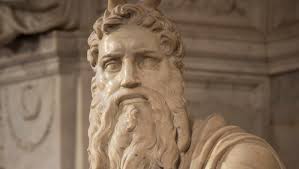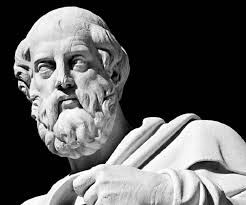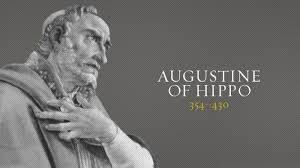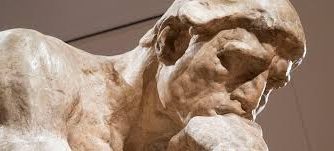The first eight big thinkers—
Today, let’s look at 8 of the 19 most well known thinkers of all time. We’ll specifically explore what they thought about God in human history.

MOSES (500 B.C.?)—Moses is considered to be the lawgiver, and the man who wrote the first five books of the Old Testament portion of the Bible (the Pentateuch). Moses identified God as an all knowing, all-powerful, all and everywhere present being.

PLATO (430 – 350 B.C.) —The Greek Plato is considered to be the first great Western philosopher. He believed that existing things are modeled on changeless, eternal forms. He also believed in a multitude of gods, who were very active in human affairs.
 ARISTOTLE (384 – 322 B.C.)—Also a Greek, Aristotle was the first to systematically describe physics, biology, psychology, and the standards of literature. He was also the first true empiricist—one who believes in the scientific method of forming a hypothesis from observations and beliefs, asking a question, designing research to test the hypothesis, doing the research to gather data, and forming a conclusion based on the research findings. He is also identified as one of the first agnostics—someone unsure about whether there really is a living God.
ARISTOTLE (384 – 322 B.C.)—Also a Greek, Aristotle was the first to systematically describe physics, biology, psychology, and the standards of literature. He was also the first true empiricist—one who believes in the scientific method of forming a hypothesis from observations and beliefs, asking a question, designing research to test the hypothesis, doing the research to gather data, and forming a conclusion based on the research findings. He is also identified as one of the first agnostics—someone unsure about whether there really is a living God.
 AUGUSTINE (A.D. 354 – 430)—While St. Augustine of Hippo originally struggled to “find” faith in Christianity, he later became one of the most important and well-known theologians in Christian history. He also addressed the tug-of-war between science and religion.
AUGUSTINE (A.D. 354 – 430)—While St. Augustine of Hippo originally struggled to “find” faith in Christianity, he later became one of the most important and well-known theologians in Christian history. He also addressed the tug-of-war between science and religion.

THOMAS AQUINAS (A.D. 1224 – 1274) Aquinas, a Catholic priest, wrote the famous work Summa Theologica. In it he offers proofs of the existence of God and outlined ways to blessedness. He was a strong Theist—belief in the existence of one God who is the creative source of the world and human race and who transcends that world while also functioning within it.

BARUCH SPINOZA (1632 – 1677)—Spinoza, who lived in Holland, believed that God is an infinite being who is identical with the world. In other words, God is alive and He is everywhere. Because He is everywhere, we are all part of the deity.
 DAVID HUME (1711 – 1776)—Hume, a Scotsman, thought the entire world is formed from the perception of our sensory experiences and believed everything had to be measured and replicated in order to believed, He doubted that we could ever really know anything with certainty. Consequently, he believed that the miraculous, and whether God existed, were irrelevant discussions.
DAVID HUME (1711 – 1776)—Hume, a Scotsman, thought the entire world is formed from the perception of our sensory experiences and believed everything had to be measured and replicated in order to believed, He doubted that we could ever really know anything with certainty. Consequently, he believed that the miraculous, and whether God existed, were irrelevant discussions.

KANT (1724 -1804)—Kant, a German, believed the human reason creates a world where all events are causally connected, (cause and effect) and this connection enables us to act in moral ways. His focus on reason as the driving force behind action, led him to believe that the mind was god.
Have you heard of any of those guys? Moses, Plato, and Aristotle, probably. Maybe Augustine. Perhaps Thomas Aquinas. But the others? Even though you might not have heard of them, can you identify their beliefs as ones you’ve read about or been taught before?
We’ll stop with Kant today.
Next week we’ll look at other movers and shakers who have influenced our thinking and helped shape our worldviews. And see how our beliefs align with or contradict theirs.

Things to Consider—
Do any of the beliefs of the philosophers we gave overviews for today resonate with you?
Do any of your beliefs sound like theirs?
Do you disagree with their judgment?
And as we move forward, be thinking about the following truth:
All of these thinkers can be wrong, but they can’t all be right.
Until next week,
Have fun thinking deep thoughts!
Blessings,
Andrea
“May you prosper in all things and be in health, just as your soul prospers” (3 John 2).
Photos courtesy of Google Images
